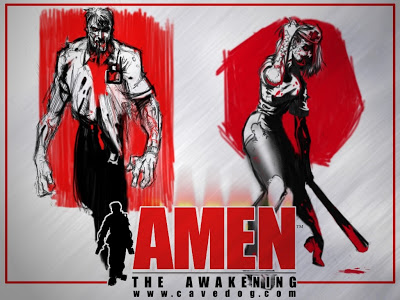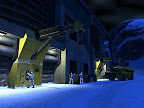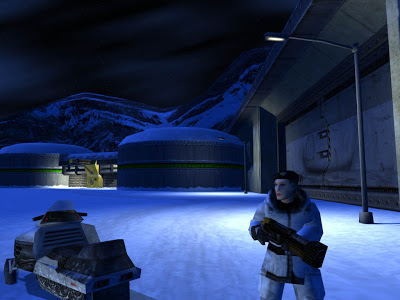This post has not been edited by the GamesBeat staff. Opinions by GamesBeat community writers do not necessarily reflect those of the staff.
As we’ve all heard, Duke Nukem Forever has been saved from an eternity of shame by the grace of developer Gearbox and its CEO, Randy Pitchford. But while Duke shambled on through 13 years of production hell, a number of other projects with troubled histories bit the dust — some of which I wish had risen, phoenix-like, from the ashes rather than the self-appointed king. And here they are!
Torn
Black Isle was, for a long time, a very special studio. Role-playing game specialists of legendary caliber, Black Isle's developers produced some of the most loved games of the last 15 years. Planescape: Torment, Fallout 1&2, and the Icewind Dale games are still spoken of with reverence. The company announced Torn in 2001 — Black Isle's most ambitious project yet. For the first time it was working with a 3D engine and creating its own fantasy IP.

Press and fans alike met Torn's announcement with great enthusiasm, but behind the scenes things were not going well. The studio was inexperienced with 3D-game development and the need to update to the latest version of the Lithtech engine it had licensed proved onerous. Worse, Interplay, Back Isle's owner, was in a dire financial position that left little margin for error. Four months after Torn was announced, it was cancelled. Still, that was plenty of time for me to get really excited about it.
Amen: The Awakening
Amen was one of a number of projects begun by now-defunct dev house Cavedog in the wake of its success with Total Annihilation. Amen was an extremely ambitious first-person shooter set in the near future after three quarters of the world’s population goes violently mad. You (would've) played a British SAS officer whose wife and daughter were killed by the so-called "afflicted." It sounded very much like a twist on the zombie genre, featuring fragmented governments spread across the globe trying to create safe zones and unraveling the mystery of what caused the madness.

Of course, this is another example of a overly ambitious title from a team without experience managing such a big project. Gamespot has a great feature about the game's downfall, including an extensive interview with lead designer Greg MacMartin. Cavedog did some cool, creative things online to build interest in the story in an age before alternate-reality games (ARGs) had a name or community managers even existed. But it seems I’ll never get a chance to discover what caused the calamity.
The Lost
 The ironically named The Lost was to be developer Irrational’s first console title. Originally announced for the PS2, the game was a modernized retelling of Dante's Inferno designed as a third-person survival-horror game. It followed the story of a mother who made a deal with the devil for a chance to enter Hell and rescue the soul of her daughter, a car-crash victim.
The ironically named The Lost was to be developer Irrational’s first console title. Originally announced for the PS2, the game was a modernized retelling of Dante's Inferno designed as a third-person survival-horror game. It followed the story of a mother who made a deal with the devil for a chance to enter Hell and rescue the soul of her daughter, a car-crash victim.
Unlike any other game on this list, The Lost was finished (back in 2003), but Ken Levine and the rest of the Irrational team decided it just wasn’t good enough to release. They chose to sit on the title in order to preserve Irrational’s reputation. Stranger still, a couple years ago reports surfaced that The Lost had been modified and released in India for the PC as Agni: Queen of Darkness, though I'm unaware if Levine or Irrational has ever commented publicly about it.
Prax War
Finally, we have a game with a direct connection to Randy Pitchford and Duke Nukem. After Duke Nukem 3D shipped, a group of 3D Realms employees decided to leave the studio and found their own development house. Among them was Randy Pitchford. The new company was called Rebel Boat Rocker, and its first and only project was Prax War. RBR signed a publishing deal with EA for the title and announced it at E3 in 1998.
At the time it looked amazing. The technology was impressive and the setting looked interesting. The physics, squad A.I. companions, and vehicle sections were incredibly ambitious.
 Unfortunately, development ran into issues and the work did not go as quickly or smoothly as expected. According to this great company post-mortem written by Randy Pitchford himself, it seems the ethic upon which the company was founded — that all members of the team were equal, and no boss figure had the authority to put his foot down — proved a hindrance to the game’s completion (surprise!). In 1999, EA pulled the plug and Rebel Boat Rockers disbanded. Pitchford, of course, learned a great deal from RBR’s failings and went on to found the very successful Gearbox. But the time for Prax War has passed.
Unfortunately, development ran into issues and the work did not go as quickly or smoothly as expected. According to this great company post-mortem written by Randy Pitchford himself, it seems the ethic upon which the company was founded — that all members of the team were equal, and no boss figure had the authority to put his foot down — proved a hindrance to the game’s completion (surprise!). In 1999, EA pulled the plug and Rebel Boat Rockers disbanded. Pitchford, of course, learned a great deal from RBR’s failings and went on to found the very successful Gearbox. But the time for Prax War has passed.
Woulda', Coulda', Shoulda'
Of course, I understand why Duke gets the Phoenix Down and not one of these four games. DNF has been in continuous development since the mid-90s, but it's a game I was never that excited for in the first place. While the stay of execution it has received is inarguably miraculous, I have trouble caring one way or the other. Now, if one of these games had made a surprise appearance at PAX, I'd be over the moon with excitement. Sure, they're all pretty dated now, but if Duke could switch to a more modern engine (something it did frequently, causing much of the delay), then why couldn't the powers of Unreal Engine 3 (or whatever) be brought to bear on Amen, Torn, The Lost, or Prax Wars?

